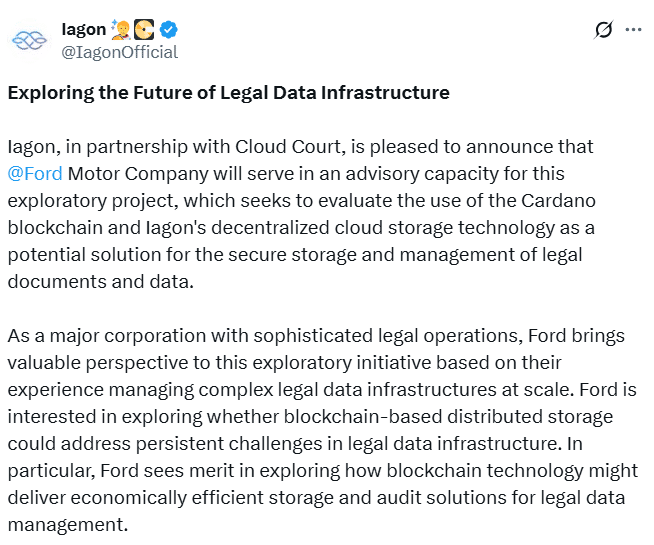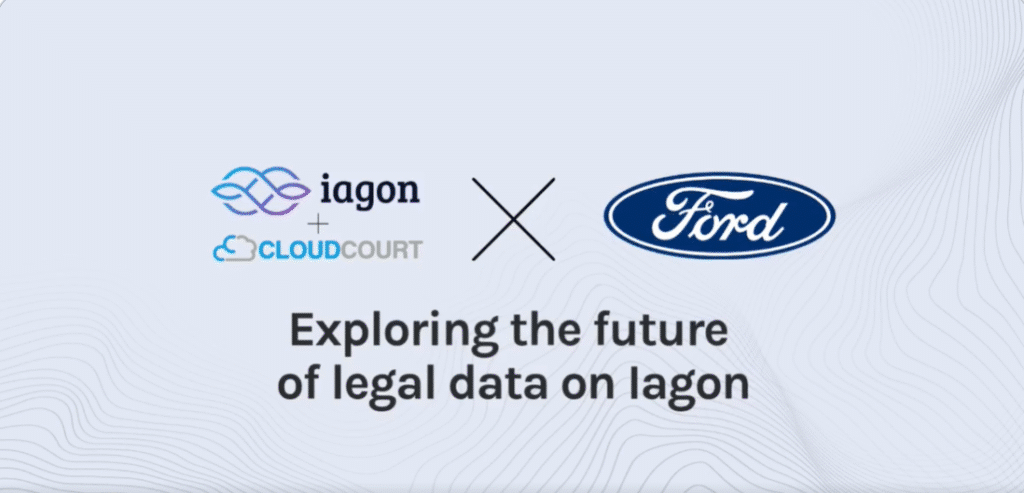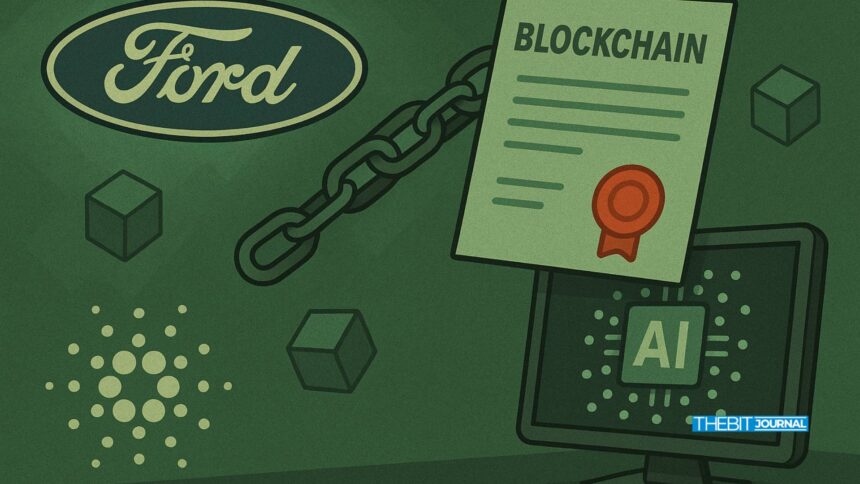The Ford blockchain project is a groundbreaking initiative that explores how blockchain technology can reshape the management and storage of sensitive legal data. In collaboration with Iagon and Cloud Court, Ford is delving into decentralized storage solutions using the Cardano blockchain.
To solve critical issues faced by legal departments in large enterprises. The project, currently in its Proof-of-Concept (PoC) stage, aims to address the challenges of data fragmentation, security risks, and compliance with regulations like HIPAA and GDPR.

Key Developments in the Ford Blockchain Project
The Ford Blockchain Project is designed to overcome longstanding issues in managing legal data. Traditional methods of storing legal records often result in fragmented systems, where data is dispersed across various departments and stored in different formats. This fragmentation increases the risks of data breaches, delays in legal preparation, and challenges in ensuring compliance with stringent regulations.
Ford is not directly funding the project but is playing an advisory role. The company brings its extensive experience in managing litigation and compliance across multiple jurisdictions to guide the project’s development. As one of the largest companies in the automotive industry, Ford’s input is essential in scaling the decentralized storage model for large-scale enterprise legal teams.
Ford Blockchain Project
The Ford Blockchain Project is built on the Cardano blockchain, with decentralized cloud storage provided by Iagon. The project’s goal is to provide a secure, efficient, and scalable solution for managing sensitive legal data such as testimonies, depositions, and transcripts.
By utilizing blockchain technology, the project aims to solve the risks associated with fragmented storage systems and ensure that legal records are encrypted, securely stored, and easily accessible.

A key feature of the Ford Blockchain Project is the integration of decentralized storage with blockchain management. Data is stored off-chain using Iagon’s cloud infrastructure, while access permissions, audit trails, and activity logs are managed on-chain through the Cardano blockchain.
The Need for Blockchain in Legal Data Management
Legal data management is a complex challenge, particularly for large enterprises dealing with vast amounts of records spread across multiple teams and formats. The lack of a centralized system makes it difficult to track and secure sensitive data, increasing the risk of security breaches and delays in legal processes.
Blockchain technology offers several advantages in addressing these challenges. It provides enhanced security through encryption and ensures that only authorized personnel have access to sensitive data.
Blockchain’s transparency feature also allows for the tracking of every action performed on the data, such as access and modification. This level of transparency is crucial in ensuring compliance with various legal and regulatory frameworks.
Cardano’s Role in the Ford Blockchain Project
The Ford Blockchain Project leverages the Cardano blockchain, known for its scalability, security, and sustainability. Cardano provides a decentralized platform ideal for use cases that require stringent data management and regulatory compliance.
By utilizing Cardano, the Ford Blockchain Project ensures that legal data is securely stored and can be easily accessed and audited when needed. The transparency and security offered by Cardano’s blockchain infrastructure make it a perfect fit for managing sensitive legal records.
AI Integration in the Ford Blockchain Project
In addition to blockchain technology, the Ford incorporates AI tools provided by Cloud Court. These AI tools are designed to analyze and organize large volumes of legal data, such as testimonies and depositions. The combination of blockchain and AI enables legal teams to process data more efficiently, making it easier to access and analyze records quickly.
The Future of the Ford Blockchain Project
The Ford Blockchain Project has the potential to transform the way legal data is stored and managed. If successful, the project could lead to broader adoption of blockchain technology in industries such as healthcare, law, and government, where data security and regulatory compliance are critical. The project’s success will depend on its ability to scale beyond the PoC stage and operate in real-world enterprise environments.
Conclusion
The Ford Blockchain Project represents a significant step in Ford’s exploration of blockchain technology. By combining decentralized storage, AI-powered analysis, and blockchain management, the project aims to revolutionize the way legal data is managed and accessed.
If successful, the Ford Blockchain Project could set a new standard for legal data management in large enterprises and open the door for greater blockchain adoption in highly regulated industries.
Frequently Asked Questions (FAQ)
1- What is the Ford Blockchain Project?
The Ford Blockchain Project is a collaboration exploring decentralized storage solutions for legal data management using the Cardano blockchain.
2- What role does Ford play in the project?
Ford acts as an advisor to guide how a decentralized model can work for enterprise legal teams.
3- How does blockchain help in legal data management?
Blockchain provides a secure, transparent, and efficient way to store and access legal data, ensuring compliance with laws and regulations.
4- Why is Cardano used in this project?
Cardano offers a secure and scalable platform to manage off-chain storage and on-chain permissions in the Ford Blockchain Project.
Appendix: Glossary of Key Terms
Ford Blockchain Project: A collaboration focused on exploring decentralized storage solutions for managing legal data using the Cardano blockchain.
Blockchain: A decentralized digital ledger that securely records transactions and data across multiple computers, ensuring transparency and security.
Cardano: A blockchain platform known for its security, scalability, and sustainability, used in the Ford Blockchain Project to manage data securely.
Decentralized Storage: A system where data is distributed across multiple locations rather than stored in a single central database, improving security and accessibility.
Off-Chain Storage: Data storage that occurs outside the blockchain, often on decentralized cloud infrastructure, while retaining the blockchain’s benefits for access and verification.
On-Chain Permissions: The management and tracking of access rights for data stored on the blockchain, ensuring that only authorized users can access or modify data.
Compliance: Adhering to laws, regulations, and policies governing data management, particularly for sensitive information in industries like law and healthcare.
Reference
CryptoTimes – cryptotimes.io





























